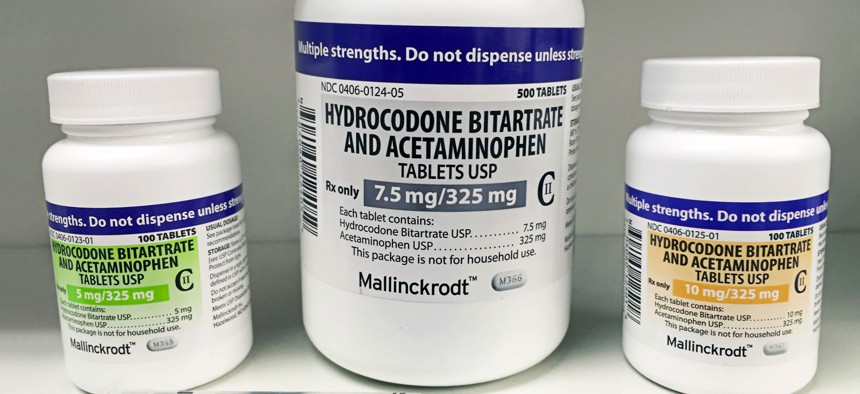Letter to the Editor: Why Florida Needs to Declare an Opioid Emergency

Shutterstock

Connecting state and local government leaders
Palm Beach County Commissioner Melissa McKinlay: “Families are demanding to be heard. Take the time to listen to them. They offer the best hope at gaining insight to a preventable epidemic.”
Editor’s note: In a packed hotel conference room in the nation’s capital on Sunday, local leaders from around the nation gathered for a National Association of Counties town hall meeting on the opioid abuse epidemic, to share their experiences dealing with the public health crisis. As Route Fifty’s Quinn Libson reported, many of those officials have been impacted personally by the ravages of opioid abuse.
Palm Beach County Commissioner Melissa McKinlay sent us this letter about how the crisis is impacting her community and why the state of Florida needs to take more decisive action.
Whose child has to die before somebody does something?
That was the question my former aide, Johnnie Easton, asked me shortly after I was elected. It was one of what would become many sleepless nights she had to call me to tell me she would be late because she was out searching the streets for her daughter, Tasha.
In mid-November of 2016, she got the answer to that question. Hers.
Since that horrible day in November when she called to tell me Tasha had been found on the floor dead of an overdose in a kitchen in some faraway apartment, I have lived with the guilt. Why didn’t I do something sooner?
I believe there is a public perception that we are doing something. We all see the billboards, the television advertisements for drug rehab centers. They are so glamorous in South Florida. Oceanfront estates and equestrian spreads for those fighting addiction. Places their loved ones can send them to miraculously get better in 30 days.
Or the other side of the issue. The homeless person on the street who seems intoxicated. I believe most people think that someone else will take care of that person—like law enforcement or a homeless center. Surely in a county as affluent as Palm Beach County, these services are abundant. And easy to find.
Wrong. On both accounts.
Nothing about addiction is glamorous. Nothing about rehab centers in South Florida is glamorous. Nothing is free. And those that are publicly funded are in such short supply that we could never possibly meet the demand of those in need.
Over 500 people—our friends, our neighbors, our family, our daughters, sons, grandparents, coworkers—died last year in Palm Beach County. Think of it in terms of a few packed movie theaters or a few full jet airplanes vanishing over the course of one year. Promising lives until their illness got the best of them. Why weren’t they saved? I know we don’t live in Utopia and our world is not perfect. Either are people. Some of those lives would not have been saved no matter what we did. But did we try hard enough? Did we open the door to a hospital room for every one of those patients suffering an overdose or pain from addiction so bad that they sought help like we would for a patient presenting at an emergency room in the midst of a heart attack or the patient who went to the doctor because they had shortness of breath who wanted to get help before the onset of a heart attack?
No. They were turned away. The reasons vary. Either they had no insurance. Or the insurance they had didn’t cover the exorbitant amount good drug treatment centers cost. Or the hospital or indigent programs didn’t have a bed available. We sent these critically ill patients facing potential death back to the streets.
This is what happened to Tasha. She asked for help. There were no beds. Apply for Medicaid they told her. As if figuring out that paperwork for a sober person wasn’t difficult enough, try doing it high on heroin. Or do what some do to get help—threaten to kill yourself and pray you get Baker acted, Florida’s forced mental health commitment statute. Or, even better, do what some parents have been forced to pray for at times—get arrested. Then, maybe just then, you can get some drug treatment in jail.
This is not how we treat people in America. All people—regardless of illness—deserve immediate medical attention when facing a medical crisis. They deserve that treatment to be safe, affordable, humane, and dignified. And we need to speak up and demand it from our elected leaders in Washington and Tallahassee, our doctors, insurance companies, the treatment industry, and local leaders like me.
I recently held a community conversation on this crisis because I wanted to hear from the families. Families are demanding to be heard. Take the time to listen to them. They offer the best hope at gaining insight to a preventable epidemic. One mother told a story about her son saying to her, “Mom, I thought I was a piece of garbage because they treated me like a piece of garbage.”
Our friends, family members, neighbors are not trash. They are people. And they need help. Please tell Gov. Rick Scott this is a public health emergency. We need his leadership, the state’s resources and our decision makers to lend a hand so we can defeat this enemy that is killing our children.
Do it for Tasha. Don’t make her death in vain.
Melissa McKinlay is a Palm Beach County, Florida, commissioner representing District 6.

NEXT STORY: Grandfathering Norfolk’s Imaginary Parking Spaces; Feds Reverse Stance on Texas Voter ID Rules




